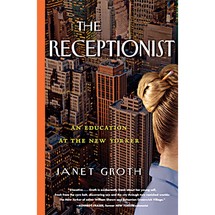A young girl from Iowa moves to the big city, gets a job at a magazine, meets lots of fancy intellectuals, tries to turn herself into a personality—only to realize she's lost herself along the way. This sound like a familiar story? In the case of
The Receptionist, it's not only true, but it also takes place in and around the fabled halls of
The New Yorker, where Janet Groth was the 18th floor receptionist for 20 years.
Much of the story is envy-inducing. Groth dishes on nights listening to Thelonious Monk play jazz, drinking with Gloria Steinem; and being sent to a ball in the English countryside by Muriel Spark. On the other hand, Janet's meekness and her difficulty in persuading people to give her the respect she craves often undercut the glamour of the rarefied life she's found. For much of the book, she settles for the pleasure of being around brilliant people (both her colleagues and many lovers) as opposed to demanding, and getting, their real acknowledgment. A few recognize her talents, and many are kind, but she's frequently underappreciated and not sure how to change that. Groth, however, isn't a woman to give up, and by the end of the book, she finds her own delightful voice, which is the book's real pleasure.


